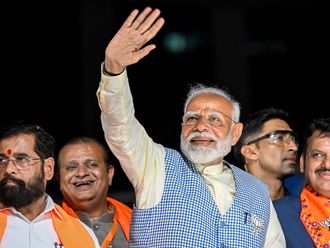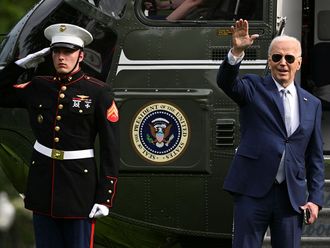
While much of the rest of the Arab world is in the grip of momentous struggle and change, the Palestinians — the architects of the intifada — remain bogged down by in-fighting and weak, self-interested leadership.
There have been moments of promise — President Mahmoud Abbas has twice found the grit to act outside America's remit since the peace process foundered at the end of 2010 — but these remain unfulfilled.
In February this year, Abbas presented a draft resolution condemning Israel's illegal colonist activity to the UN Security Council. Before the meeting, President Barack Obama called Abbas personally and warned him of serious ‘repercussions' if he went ahead. Although the administration has frequently condemned colonies, the US used its veto for the first time since Obama took office in 2009 to block Abbas' ‘anti-Israel' resolution.
In early May, the Palestinians rocked the boat again when Fatah and Hamas signed a Unity accord, brokered by the new Egyptian interim government, agreed to hold elections and reform the PLO and its institutions. Palestinian in-fighting had afforded Israel the luxury of a ‘divide and rule' scenario for more than four years; the Hebrew state was, rightly, alarmed.
Along with unity came the promise of statehood. In his speech to the UN General Assembly in 2010, Obama had said he expected Palestine to become a full member of the UN by autumn this year.
Now Abbas announced that — in the face of Israeli intransigence at the negotiating table — he would unilaterally seek recognition for an independent Palestinian state at the UN in September.
In a round of ferocious diplomacy aimed at reviving the rift between Fatah and Hamas, Israeli Premier Benjamin Netanyahu gave Abbas an ultimatum, declaring that he must choose between Hamas and Israel as a negotiating partner.
Obama, meanwhile, decided that Palestinian unity was an ‘obstacle' to the peace process since it would involve talking to Hamas. (Obama has no problem talking to the Muslim Brotherhood or negotiating with the Taliban as we have seen in recent weeks. His exclusion of Hamas, then, is purely at Israel's command.)
The Fatah-Hamas alliance was already rocky, having been founded on despair rather than ambition. Both factions have been weakened by recent events — Fatah by the failure of its peace talks with Israel, Hamas by the loss of support from Syria (due to the revolution) and Hezbollah (due to Sunni-Shiite tensions throughout the region).
Now they are at loggerheads over their choice of prime minister. Hamas favours an independent representative from Gaza, Jamal Al Khudari, while Fatah wants to retain the services of the present incumbent, Salam Fayyad.
Fayyad is considered indispensable by the PNA's 150,000 employees and an additional 75,000 in receipt of generous monthly ‘allowances' since he is the only trusted conduit used by the so-called ‘donor countries' to channel funds to the PNA.
Bankruptcy is greatly feared by the well-fed PNA elite and this is a weakness Israel and her backers can easily tap into. In an effort to pressure Fatah leaders into excluding Hamas from a future government, Israel froze payments of customs duties it collects on behalf of the PNA and the US convinced regional donor countries to withhold aid payments — so far the PNA has received just $331 million (Dh1.22 billion) of $970 million pledged for the year.
PNA employees are currently receiving only half of their usual inflated salaries. Since these salaries are, in effect, bribes to refrain from any criticism of their paymasters, failure to pay them may result in widespread revolt.
Abbas gained respect from the Palestinian people when he stood up to the US with February's draft UN resolution. Sadly, he is not demonstrating the same steadfastness in regard to the unilateral declaration of statehood mooted for September. Obama now says the US would veto the move, and Abbas recently described his own project as ‘a miscalculated step'.
The PNA's chief negotiator, Saab Erekat, has been dispatched to Washington to discuss formulas for retreat and Abbas has let it be known among the Quartet members that he would be willing to return to the negotiating table with the Israelis.
Mass sycophancy
Abbas represents neither his own people nor common sense by seeking US backing for his own political decisions. Obama is unable to oblige. Obama's approach to Israel has lurched from sternness to deference to entreaty; but it makes no difference, so confident is the state of absolute support from the powerful pro-Israel lobby in Washington.
When Netanyahu addressed the Senate and the House of Representatives in May, he was given multiple standing ovations in a dazzling display of mass sycophancy.
Abbas faces political bankruptcy if he fails to hold his nerve in September; his supporters will vanish with their unpaid salaries and the Palestinian people will never trust him again.
The Palestinians have to stop giving in to adverse foreign pressure. It is no excuse that Israel is too strong an enemy — the Taliban have demonstrated what is possible by beating the combined forces of Nato after 10 years of war.
The Palestinians have friends as well as enemies on the international stage — showing political and diplomatic fortitude in the face of obvious injustice and bullying would win them many more.
It is time for the Arab Spring to reach Palestine. The old, corrupt regime has delivered nothing but disappointments. The Palestinians deserve a strong, representative government with the integrity, the determination and the clout to continue the real struggle — which is against the Israeli occupation.
Abdel Bari Atwan is the editor of the pan-Arab newspaper Al Quds Al Arabi.











